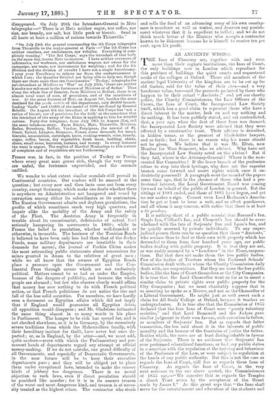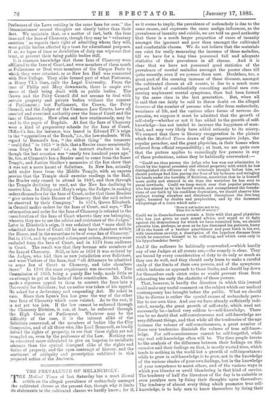AN ANCIENTS' WRONG.
THE Inns of Chancery are, together with and even more than their cognate institutions, the Inns of Court, the only buildings now in London which reproduce for this province of buildings the quiet courts and sequestered nooks of the colleges at Oxford. These old members of the ancient legal University of the kingdom are to be cut up for old timber, sold for the value of their sites—and a very handsome value, too—and the proceeds pocketed by those who happen to be their actual " Ancients ;" and yet our charity police, the Charity Commissioners, the Law Officers of the Crown, the Inns of Court, the Incorporated Law Society itself, which has a good claim to represent those who have of direct interest in the matter, look on and say nothing and do nothing. It has been publicly stated, and not contradicted, that, a year ago, when the first of these Inns was doomed, the Incorporated Law Society were advised that they were affected by a constructive trust. Their adviser is described, in hidden terms, as the greatest of black-letter lawyers, and so forth ; but there is no reason why his name should not be given. We believe that it was Mr. Elton, now Member for West Somerset, who so advised. Why have not the Incorporated Law Society acted on the advice ? But if they fail, where is the Attorney-General ? Where is the newcreated Bar Committee ? If the lower branch of the profession refuse to step into their heritage, why does not the superior branch come forward and assert rights which once it undoubtedly possessed? A paragraph went the round of the papers some time ago, that in the absence of those who had a professional interest, the Local Government Board was coming forward on behalf of the public of London in general. But the sittings of 1884 ended, and those of 1885 have begun, and yet no one makes a sign. Cannot even Lord Brabazon's Association be got at least to issue a writ, and so affect purchasers, and all whom it may concern, with notice that there is at least a lis pendens.
It is nothing short of a public scandal that Barnard's Inn, Staple Inn, Clifford's Inn, and Clement's Inn should be overwhelmed with the fate of Serjeants' Inn and Lyon's Inn, and be quietly annexed by private individuals. To any unprejudiced person there can be no question that these "Ancients," who assume thus to deal as their own with property which has descended to them from four hundred years ago, aro public bodies dealing with public property. It is true they are not, as was rashly assumed by a "Londoner " in the Times, corporations. But that does not make them the less public bodies. Few of the bodies of Trustees whom the Endowed Schools' Commission dealt with, or whom the Charity Commission daily deals with, are corporations. But they are none the less public bodies, like the Inns of Court themselves or the City Companies. It is true that the Lord Chancellor went so far as to assert a similar claim to private rights over public property for the
City Companies ; but we must charitably suppose that in so asserting he spoke as a Mercer, and not as the Chancellor of a Liberal Government. He might just as well assert such a claim for All Souls' College at Oxford, because it teaches no undergraduates. It is true also that the Commission of 1855 declared that the four Inns of Court were "purely voluntary societies," and that Lord Bramwell and the Judges gave similar judgment in their own favour, with execution to follow, as members of Serjeants' Inn. Bub as regards that latter transaction, the less said about it in the interests of public morality and the honour of the fountains of justice the better.
Besides which, the cases are at least distinguishable in favour of the Serjeants. There is no evidence that Serjeants' Inn ever performed educational functions, or had any public duties in connection with the regulation of the training and behaviour of the Professors of the Law, or were subject to regulation at the hands of any public authority. But this is not the case as regards the Inns of Court, still less as regards these Inns of Chancery. As regards the Inns of Court, in the very next sentence to the one above quoted, the Commissioners of 1855 say,—" We conceive that as regards the Temples a direct Trust arises by the acceptance of the Grant made by James I." As this grant says that " the Inns shall serve for the entertainment and education of the students and Professors of the Laws residing in the same Inns for ever," the Commissioners' second thoughts are clearly better than their first. We maintain that, as a matter of fact, both the four Inns and the Inns of Chancery, though they may be voluntary societies " as regards their right of admitting whom they will, were public bodies affected by a trust for educational purposes. If so, no lapse of time or dereliction of duty can wipe-out that trust, or prevent their being public bodies still.
It is common knowledge that these Inns of Chancery were affiliated to the Inns of Court, and were members of them much as Folkestone or Deal were members of the Cinque Ports to which they were attached, or as New Inn Hall was connected with New College. They alike formed part of what Fortescue, in Henry VI.'s time, calls the Legal University. From the time of Philip and Mary downwards, there is ample evidence of their being dealt with as public bodies. The Crown and the Privy Council did not assume to deal with private property and private bodies without the consent of Parliament ; but Parliament, the Crown, the Privy Council, and the Judges of the Common Law Courts, have all asserted and exercised authority over the Inns of Court and the Inns of Chancery. How often and how continuously, may be read in the pages of Dugdale. At first the Inns of Chancery were a kind of preparatory schools for the Inns of Court. Clifford's Inn, for instance, was leased in Edward IV.'s reign to the "apprentices of the Bench," i.e., the law-students. With regard to Barnard's Inn, " the oldest thing " the treasurer " could find " in 1855 " is this, that a Reader came occasionally from Gray's Inn to read," i.e., to instruct students in law, though the last occasion was " nearly two hundred years ago." So, too, at Clement's Inn a Reader used to come from the Inner Temple, and Justice Shallow's memories of the Inn show that it was not a mere haunt of Solicitors. In New Inn, actually held under lease from the Middle Temple, with an express proviso that the Temple shall exercise readings in the Hall, the Reader only ceased to attend in 1846, and then through the Temple declining to send, not the New Inn declining to receive him. In Philip and Mary's reign, the Judges, in making orders themselves for the Inns of Court, order that these Readers " give orders to their Houses of Chancery that the said orders be observed by their Company." In 1574, Queen Elizabeth in Council makes orders for the Inns of Court, and says, The reformation and order for the Inns of Chancery is referred to the consideration of the Inns of Court whereto they are belonging, wherein they are to use the advice and assistance of the Judges." Later in Elizabeth's reign, it was ordained that " none shall be admitted into Inns of Court till he may have chambers within the House, and in the meantime to be of some Inn of Chancery." But in 1556, and by repeated subsequent orders, Attorneys were excluded from the Inns of Court, and in 1574 from audience in Court. The result was that they became sole members of the Inns of Chancery. Still, so late as 1654 it was ordered by the Judges, who had then as now jurisdiction over Solicitors, and were Visitors of the Inns, that " all Attorneys be admitted to some Inn of Court or Chancery, and take chambers there." In 1704 the same requirement was re-enacted. The Commission of 1855, being a purely Bar body, made little or no attempt to get at the facts of their constitution. Mr. Clode made a vigorous appeal to them to convert the Inns into a University for Solicitors ; but no notice was taken of his appeal. He asked for a declaratory and suspending Act. He asked in vain. Since then Lyon's Inn has gone the way of the other four Inns of Chancery which once existed. As to the rest, it is not yet too late. If the law cannot be enforced through the Chancery Division, it can, at least, be enforced through the High Court of Parliament. Whatever may be the difficulty of the case, it is the interest alike of the Solicitors concerned, of the members of bodies like the City Companies, and of all those who, like Lord Bramwell, so loudly defend the rights of property, to see that these rights are not trampled on, even by the professors of the Law. Nothing can bs conceived more calculated to give an impetus to socialistic schemes than the cynical disregard alike of the rights and duties of property, and the open contempt of history, and the sentiment of antiquity and prescription exhibited' in this proposed action of the Ancients.



































 Previous page
Previous page